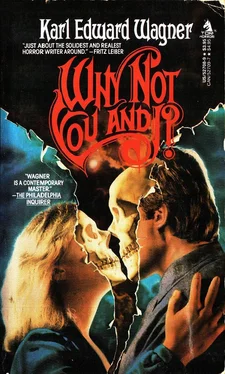Damon Harrington smiled, feeling extremely foolish in the silly Styrofoam boater hat the con committee had given them to wear for the meet-the-pros party. Discon with its thousands of fans and frenetic pace was a bit overawing to the author of half a dozen published stories. He’d had to show his S.F.W.A. card to get his pro hat and free drink voucher, and already Harrington was kicking himself for not staying in the hucksters’ room. He’d carried along a near-mint run of the first dozen issues of The Fantastic Four, saved from high school days, and if he could coax one of the dealers out of a hundred bucks for the lot, he could about cover his expenses for the trip.
“Hey, look,” Harrington protested, “I’m only doing this for the free drink they gave up for being put on display.”
Trevor Nordgren tipped his Styrofoam boater. “Don’t forget this nifty ice bucket.”
Harrington swirled the ice cubes in his near empty plastic cup, trying to think whether Trevor Nordgren should mean anything to him, painfully aware that Nordgren was puzzling over his name as well. An overweight teenage fan, collecting autographs on her program book, squinted closely at each of their badges, stumped away with the air of someone who had just been offered a swell deal for the Washington Monument. She joined a mass of autograph seekers clumped about a bewhiskered Big Name Author.
“God, I hate this!” Nordgren crunched his ice cubes. He glowered at the knots of fans who mobbed the famous authors. In between these continents of humanity, islands of fans milled about the many not-quite-so-big-name authors, while other fans stalked the drifting Styrofoam hats of no-name authors such as Harrington and Nordgren. An ersatz Mr Spock darted up to them, peered at their name badges, then hurried away.
“It would help if they just would give us T-shirts with our names printed across the back,” Harrington suggested. “That way they could tell from a distance whether we were worth attention.”
A well-built brunette, braless in a T-shirt and tight jeans, approached them purposefully, selecting a copy of the latest Orbit from a stack of books cradled against her hip. “Mr Nordgren? Mr Harrington? Would you two mind autographing your stories in Orbit for me?”
“My pleasure,” said Nordgren, accepting her book. He scribbled busily.
Harrington struggled over being “mistered” by someone who was obviously of his own age group. He hadn’t read Nordgren’s story in the book — had only reread his own story in search of typos — and he felt rather foolish.
“Please, call me Trevor,” Nordgren said, handing the book to Harrington. “Did you read ‘The Electric Dream’?”
“I thought it was the best thing in the book.” She added: “I liked your story, too, Mr Harrington.”
“Is this your first con?” Nordgren asked.
“First one. Me and my old man rode down from Baltimore.” She inclined her head toward a hulking red-bearded biker who had materialized behind Nordgren and Harrington, a beer bottle lost in one hairy fist. “This is Clay.”
She retrieved her book, and Clay retrieved her.
“My first autograph,” Harrington commented.
Nordgren was gloomily watching her departure. “I signed a copy of Acid Test about half an hour ago.”
Recognition clicked in Harrington’s memory: a Lancer paperback, badly drawn psychedelic cover, bought from a bin at Woolworth’s, read one weekend when a friend brought over some Panama red.
“I’ve got a copy of that back in L.A. That was one far-out book!”
“You must have one of the twelve copies that were sold.” Nordgren’s mood openly brightened. “Look, you want to pay for a drink from these suckers, or run up to my room for a shot of Jack Daniel’s?”
“Is the bear Catholic?”
When Nordgren poured them each a second drink, they agreed wholeheartedly that there was no point in returning to the ordeal of the meet-the-pros party. Nordgren had actually read Harrington’s story in Orbit and pronounced it extremely good of its type; they commiserated in both having been among the “and others” on the cover blurb. They were both products of the immediate post-war baby boom; incredibly, both had been in Chicago for the bloody demonstrations during the Democratic primary, though neither had been wounded or arrested. Nordgren was in the aftermath of an unpleasant divorce; Harrington’s lover of the Flower Children years had lately returned to Boston and a job with the family law firm. Nordgren preferred Chandler to Hammett, Harrington preferred Chandler’s turn of a phrase; they agreed modern science fiction writers were nothing more than products of the market. The Stones and the Who were better than the Beatles, who actually weren’t innovative at all, and listening to Pink Floyd while tripping had inspired at least one story from them both. Val Lewton was an unsung genius, to which ranks Nordgren added Nicholas Ray and Harrington Mario Bava, and Aldrich had peaked with Kiss Me Deadly.
They hit it off rather well.
Nordgren punished the bottle, but Harrington decided three drinks were his limit on an empty stomach, and concentrated on rolling joints from some leafy Mexican Nordgren had brought down from New York. They had both sold stories to Cavalier , and Harrington favorably remembered Nordgren’s one about the kid and the rubber machine in the redneck filling station. Harrington scraped along as cashier at an all-night self-service gas station, which afforded him lonely hours to write. Nordgren had been writing full time up until the divorce (he admitted to a possible cause-effect relationship there), and he was just completing his tenth novel — the second under his real name. Nordgren confessed to having paid the bills by writing several porno novels for Bee Line and Essex House, under the unsubtle pseudonym Mike Hunt.
He was quite proud of the Essex House novels, which he said developed science fiction themes that Britain’s New Wave would have deemed far too outrageous, and he produced a copy of Time’s Wanton and incomprehensibly inscribed it to Harrington. It was about a woman who used her psychic powers to project her consciousness through time, Nordgren explained, emptying the bottle, and she took possession of various important historical personages and goaded them through extravagant sexual excesses that changed the course of history. It was, said Nordgren, a theme not dissimilar to his almost completed novel, Out of the Past , in which a Victorian medium projected her consciousness into the present day to control a teenage girl’s mind. Harrington warned Nordgren that the market for fantasy novels was about nil, but Nordgren thought he could push the psychic powers angle enough to qualify as science fiction. Harrington allowed that his only novel to date had been a near miss — a post-nuclear holocaust thing sold to Powell Publications, a Los Angeles shoestring operation that folded with his Iron Night already in galleys.
It was a tough game, and they both agreed they considered themselves outlaws. Nordgren suggested they check out the parties for some free drinks, and Harrington suggested they look for something to eat. Somewhere along the way Nordgren ran into some New York friends and was carried off, and Harrington wandered into the night in search of cheap pizza.
They managed to get together several more times over the course of the convention. Harrington found a three-year-old copy of F&SF containing what he considered his best story published to date, and he presented it to Nordgren in return for Time’s Wanton. They exchanged addresses, agreed to stay in touch, and parted on the best of terms.
They actually did stay in touch, although correspondence was sporadic. Nordgren wrote long letters of comment on books and films he’d caught; Harrington was inclined to talk shop and discuss possible fiction markets. Nordgren kept him posted about his progress on Out of the Past , its completion, its rejection by various publishers. Harrington sold a short story to F&SF and was contemplating a major revision of Iron Night after having had it rejected by every publisher in the English-speaking world. Nordgren asked to read the manuscript, offered some badly needed criticisms (“Writing a short story all in present tense may be artsy as hell, but an entire novel?”), and grudgingly Harrington followed some of his advice.
Читать дальше












